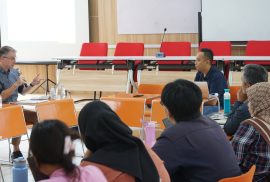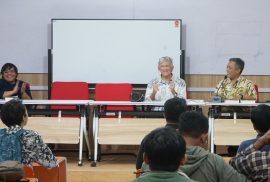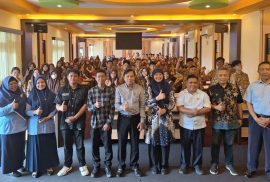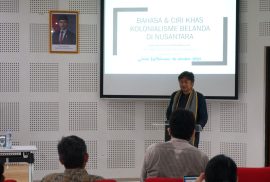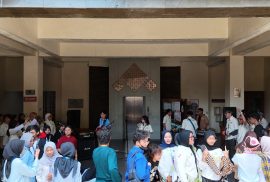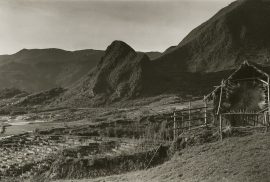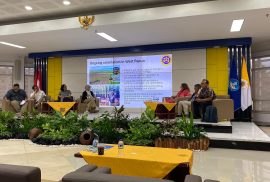Pada hari Kamis, 27 November 2025, Program Studi S2 Departemen Sejarah UGM mengadakan kegiatan masterclass dan kolokium mahasiswa yang mengangkat tema serta persoalan studi kebudayaan. Kegiatan ini diikuti oleh mahasiswa S2 Sejarah yang memiliki minat dan fokus kajian dalam isu kebudayaan dalam historiografi Indonesia. Dalam kegiatan ini pula turut hadir Dr. Abdul Wahid M.Hum., M.Phil. dan Joss Wibisono selaku tenaga pengajar dan dosen tamu di Departemen Sejarah UGM yang juga turut aktif memperhatikan, memberikan masukan, dan juga kritik bagi mahasiswa yang memaparkan tema riset dan penelitian yang dilakukan. Di samping itu, turut hadir dalam kegiatan ini Dr. Arnout van der Meer, seorang Sejarawan dan Peniliti dari Colby College, Amerika Serikat untuk memberikan saran dan masukan terhadap para mahasiswa yang melaksanakan kolokium.
Foto: Mochamad Rizky Saputra
Pada hari Jumat, 21 November 2025 bertempat di Ruang Multimedia Margono Fakultas Ilmu Budaya UGM, Departemen Sejarah UGM bekerjasama dengan Yayasan Obor Indonesia mengadakan kegiatan bedah dan peluncuran buku “Bacaan Bumi: Pemikiran Ekologis untuk Indonesia”. Buku ini merupakan karya historiografi lingkungan Indonesia yang ditulis atas kolaborasi para Penulis, Sejarawan, dan Akademisi Indonesia dan Asing yang memiliki minat dan perhatian pada kajian lingkungan di bawah tanggungjawab dari Prof Gerry van Klinken, professor emiritus dari Universitas Amsterdam Belanda. Turut hadir dalam kegiatan ini Dr. Abdul Wahid M.Hum., M.Phil dan Dr. Farabi Fakih S.S., M.Phil. sebagai perwakilan dari Departemen Sejarah UGM dan juga penulis yang terlibat dalam kajian ini. Secara umum, kajian ini berusaha untuk menghadirkan pembaruan dalam narasi historiografi Indonesia yang lebih berfokus dan memberikan ruang narasi bagi aktor-aktor non manusia yang turut berpengaruh dalam setiap perkembangan dan dinamika sosial, politik, dan ekonomi yang terjadi di Indonesia maupun global. Hadirnya karya ini pula memiliki pesan moral dan bentuk kritik nyata atas realitas kapitalisme yang terjadi di Indonesia maupun dunia yang semakin bersifat ekstraktif dan eksploitatif tanpa memerhatikan dampak dan kerusakan lingkungan yang disebabkan oleh aktivitas kapitalisme ini.
Pada hari Kamis, 20 November 2025 Departemen Sejarah Fakultas Ilmu Budaya mengadakan Kuliah Umum bagi mahasiswa Departemen Sejarah UGM dan Masyarakat Umum yang berusaha untuk memberikan pembahasan tentang Kajian Pariwisata di Hindia Belanda khususnya Jawa pada periode kolonial. Turut membersamai dan mengisi dalam kegiatan ini Dr. Arnout van De Meer seorang sejarawan, peneliti, dan pengajar yang berkedudukan di Colby College, Amerika Serikat. Beliau dikenal sebagai seorang sejarawan yang memiliki bidang keahlian dan minat dalam kajian sejarah global dan Asia Tenggara. Dalam Kuliah Umum ini pula turut hadir Dr. Abdul Wahid M.Hum., M.Phil. selaku Kepala Departemen Sejarah UGM dan dipandu oleh Uji Nugroho Winardi S.S., M.A. selaku moderator dalam kuliah umum ini.
Pada Rabu, 12 November 2025 Departemen Sejarah Universitas Gadjah Mada bekerjasama dengan Manajemen SMA Negeri 1 Bantul Yogyakarta melakukan Sarasehan dan Sosialisasi terkait Departemen Sejarah kepada para siswa dari SMA Negeri 1 Bantul. Dalam kegiatan ini turut hadir Dr. Abdul Wahid, M.Hum., M.Phil. dan Dr. Mutiah Amini, M.Hum. sebagai pembicara dalam kegiatan Sarasehan ini. Dalam kesempatan ini, Dr. Abdul Wahid sebagai Kepala Departemen Sejarah UGM menyampaikan materi perkenalan Program Studi Sejarah Universitas Gadjah Mada meliputi visi dan misi, Program Studi, Sistem Kurikulum, Dosen dan Tenaga Pendidik, serta capaian dan prestasi yang diperoleh oleh Mahasiswa dan Dosen di dalam Departemen Sejarah Universitas Gadjah Mada. Di samping itu, dalam kegiatan ini pula turut hadir Dicky Ramadhan dan Erlangga Buges Hidayatullah sebagai perwakilan dari Mahasiswa S1 Sejarah UGM dan Pengurus Himpunan Badan Keluarga Mahasiswa Sejarah UGM guna menjelaskan dan berbagi pengalaman terkait kehidupan perkuliahan sebagai mahasiswa Sejarah UGM serta program pengembangan karekter, kreativitas, dan kompetensi mahasiswa yang dijalankan oleh Badan Keluarga Mahasiswa Sejarah.
Pada hari Senin, 27 Oktober 2025 Departemen Sejarah mengadakan kegiatan Peluncuran dan Diskusi Buku “Nusakambangan Luar Dalam” suatu karya Historiografis dari Dr. Klaas Stutje seorang Sejarawan dan Peneliti dari NIOD dan Universiteit van Amsterdam Belanda. Ia tertarik pada kajian sejarah sosial masyarakat di Hindia Belanda yang ditinjau dari sudut pandang akar rumput di mana narasi terkait kelompok masyarakat marjinal menjadi fokus utama dari kajian dan narasi Historis yang dikembangkannya. Pada kegiatan ini pula turut hadir Dr. Wildan Sena Utama dan Joss Wibisono yang mewakili Departemen Sejarah UGM yang pada kegiatan ini diberikan kesempatan untuk menjadi moderator dan juga penanggap dari diskusi akademik yang dilakukan oleh Dr. Klaas Stutje. Kegiatan ini turut dihadiri pula oleh Mahasiswa S1 dan S2 serta beberapa Civitas Akademika Fakultas Ilmu Budaya UGM.
Pada hari Kamis,16 Oktober 2025, Departemen Sejarah FIB UGM bekerjasama dengan Program Studi Doktor Ilmu-Ilmu Humaniora FIB UGM menyelenggarakan suatu Seminar dan Studi Wawasan yang mengangkat Tema “Bahasa dan Ciri Khas Kolonialisme di Nusantara”. Seminar ini diisi oleh Joss Wibisono, seorang Jurnalis dan Peneliti yang memiliki keahlian dan banyak menulis tentang praktik kolonialisme di Hindia Belanda ditinjau melalui sudut pandang Bahasa dan Sejarah Indonesia pasca kemerdekaan. Beliau pula dikenal sebagai seorang kontributor dalam berbagai Media Online seperti Tempo, Historia.id, dan Indoprogres. Seminar ini dibersamai pula oleh Uji Nugroho Winardi, S.S., M.A., salah satu akademisi dan tenaga pendidik dari Departemen Sejarah FIB UGM, yang bertindak sebagai moderator. Turut hadir dalam kegiatan ini Kepala Departemen Sejarah UGM Dr. Abdul Wahid, M.Hum., M.Phil. yang memberikan sambutan dan kata pembuka dari kegiatan ini.
Pada Sabtu, 20 September 2025,Departemen Sejarah Universitas Gadjah Mada bekerjasama dengan Pengurus Angkatan S1 Sejarah tahun 2024 mengadakan kegiatan Family Gathering dan Kenal Lebih Dekat Keluarga Sejarah bagi Mahasiswa Baru S1 angkatan 2025. Turut hadir dalam kegiatan ini Kepala Program Studi S1 Departemen Sejarah, Dr Mutiah Amini S.S,.M. Hum. yang secara simbolis membuka rangkaian kegiatan ini. Pada moment sambutan ini, Dr Mutiah Amini menitipkan pesan tentang pentingnya menjaga kesehatan baik secara fisik maupun emosional dalam menjalankan kehidupan akademik bagi Mahasiswa Baru angkatan
2025. Rangkaian kegiatan Family Gathering tahun ini terdiri atas beberapa segmen kegiatan antara lain Kenal Kakak Tingkat, Kenal Alumni, dan Sharing Session terkait kehidupan akademik serta persiapan karir bersama Dosen Departemen Sejarah UGM Dr Widya Fitria Ningsih S.S.,M.A. dan Alumni Ayu Wulandari M.Hum. Kegiatan Family Gathering ini pula dimeriahkan dengan berbagai kegiatan yang meningkatkan interaksi, komunikasi dan solidaritas antar mahasiswa baru angkatan 2025. Dalam kegiatan ini, Anindya Nitya Safa Putri selaku Ketua Pelaksana Family Gathering Sejarah 2025 menyampaikan bahwa kegiatan Family Gathering ini sendiri terdiri atas kegiatan Sharing Session dan Outbound yang dibagi dalam dua hari kegiatan. Kegiatan Family Gathering
ini sendiri memiliki tujuan untuk menjalin hubungan dan relasi yang sehat juga asertif antara Pengurus Departemen, Kakak Tingkat dan Mahasiswa Baru Departemen Sejarah UGM. Disamping itu, dalam kegiatan ini Safa juga berharap bahwa setelah kegiatan ini dilaksanakan besar harapannya akan tercipta komunikasi dan kerjasama yang lebih harmonis antar Mahasiswa Program Studi S1 Sejarah UGM pada kegiatan mendatang.
Batas akhir pendaftaran: 30 November 2025
Periode penelitian: 2026
Tentang Program
Program ini merupakan bagian dari penelitian payung bertajuk “Tracing evolutionary pathways in grassroots climate governance: Connecting the past, present, and future inter-scalar adaptation strategies in Southeast Asia – TRACE” yang berbasis di KITLV, Leiden, Belanda. Mengusung topik “Tracing irrigated agriculture in the Indonesian archipelago”, Departemen Sejarah Universitas Gadjah Mada sebagai mitra dalam program tersebut mengundang mahasiswa maupun alumnus yang tertarik untuk menelusuri pengetahuan tradisional yang terkait dengan pertanian beririgasi, terutama pertanian padi sawah di Jawa, Bali, Nusa Tenggara, Sulawesi dan pulau-pulau di Indonesia Timur. Jenis pengetahuan apa yang dilestarikan, bagaimana pengetahuan tersebut disimpan, dan bagaimana hubungan antara berbagai bentuk ontologi adalah pertanyaan-pertanyaan utama yang berusaha dikaji oleh penelitian ini. Program ini ingin mengkaji berbagai lapisan ingatan dan pengetahuan yang ada di antara masyarakat petani padi berbasis irigasi di nusantara. Lapisan-lapisan ini menunjukkan kemunculan dan keterikatannya dengan negara, termasuk kerajaan-kerajaan tradisional, kesultanan, negara kolonial Hindia Belanda, dan Republik Indonesia pascakemerdekaan. Melalui etnografi/sejarah lisan dan penelitian arsip, serta dengan menyediakan ruang bagi agensi petani/masyarakat, program ingin bekerja sama dengan masyarakat petani, kelompok-kelompok lingkungan, dan pemerintah untuk menelusuri pengetahuan yang telah diwariskan dari berbagai generasi mengenai pengetahuan ekologi yang terkait dengan penciptaan dan pemeliharaan pertanian beririgasi.
Pada Rabu, 1 Oktober 2025, Departemen Sejarah Universitas Gadjah Mada berkolaborasi dengan Program Studi Magister Hubungan Internasional Fakultas Ilmu Sosial dan Politik Universitas Gadjah Mada mengadakan suatu kegiatan launching buku “Rethinking Histories of Indonesia: Experiencing, Resisting, and Renegotiating Coloniality” yang coba dikolaborasikan serta dikaitkan dengan rangkaian kegiatan Go South (Annual Convention on The Global South) 2025 yang mengusung tema 70 Years Bandung Spirit (Re-Invigorating Decolonial Struggle Amidst Geopolitical Turbulence). Turut hadir dan berpartisipasi dalam kegiatan ini beberapa dosen dan tenaga pengajar dari Departemen Sejarah Universitas Gadjah Mada seperti Dr. Abdul Wahid M.Hum., M.Phil., Dr. Widya Fitria Ningsih S.S., M.A., dan Dr. Wildan Sena Utama S.S., M.A., yang berpartisipasi sebagai pembicara, penanggap, dan juga moderator dalam kegiatan ini. Disamping para ahli dan peneliti yang berasal dari Universitas Gadjah Mada, kegiatan peluncuran buku ini pula turut dihadiri oleh para peneliti dari luar Universitas Gadjah Mada utamanya yang turut terlibat dalam kajian dan penulisan buku ini seperti Prof. Katherine McGregor (University of Melbourne), Brigitta Isabella M.A. (Institut Seni Indonesia), dan Dr. I Ngurah Suryawan (Universitas Papua).
Hosted in Europe or Southeast Asian countries | 3 Fellowships | 2 months each
Application deadline: 31 December 2025
Fellowship period: Autumn 2026
The Restituting, Reconnecting, Reimagining Sound Heritage (Re:Sound) project invites applications for three short-term research fellowships aimed at scholars, curators, artists, and source community members from Southeast Asia. These fellowships seek to support original research and curatorial experimentation within two main sound collections in the Netherlands: The Jaap Kunst Collection at the Universiteit van Amsterdam (UvA) and The Philips Omroep-Hollandse Indies radio broadcasts at the Netherlands Institute for Sound and Vision (NISV), or other repositories of source communities from Southeast Asia in Europe and repositories in Southeast Asia relevant to Re:Sound.

